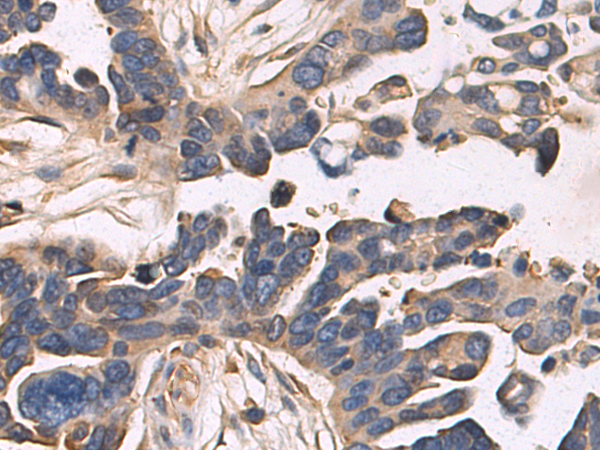
| WB | 咨询技术 | Human,Mouse,Rat |
| IF | 咨询技术 | Human,Mouse,Rat |
| IHC | 1/50-1/200 | Human,Mouse,Rat |
| ICC | 技术咨询 | Human,Mouse,Rat |
| FCM | 咨询技术 | Human,Mouse,Rat |
| Elisa | 1/5000-1/10000 | Human,Mouse,Rat |
| Aliases | PTPG; HPTPG; RPTPG; R-PTP-GAMMA |
| Host/Isotype | Rabbit IgG |
| Antibody Type | Primary antibody |
| Storage | Store at 4°C short term. Aliquot and store at -20°C long term. Avoid freeze/thaw cycles. |
| Species Reactivity | Human, Mouse |
| Immunogen | Synthetic peptide of human PTPRG |
| Formulation | Purified antibody in PBS with 0.05% sodium azide and 50% glycerol. |
+ +
以下是关于PTPRG抗体的3篇参考文献摘要(文献信息为模拟示例,建议通过数据库核实原文):
---
1. **"PTPRG as a prognostic biomarker in glioblastoma: Immunohistochemical analysis"**
*作者:Xiao Y, et al. (2020)*
摘要:研究通过PTPRG抗体进行免疫组化检测,发现胶质母细胞瘤组织中PTPRG蛋白低表达与患者生存期缩短显著相关,提示其可能作为预后标志物。
2. **"Loss of PTPRG expression promotes colorectal cancer progression"**
*作者:Sarno M, et al. (2018)*
摘要:利用PTPRG特异性抗体分析结直肠癌组织,发现PTPRG表达缺失与肿瘤侵袭性增强及转移相关,验证其作为抑癌基因的功能。
3. **"PTPRG modulates synaptic plasticity via antibody-based localization studies"**
*作者:Hendriks WJ, et al. (2015)*
摘要:通过PTPRG抗体标记发现该蛋白富集于海马神经元突触后膜,提示其在突触可塑性和神经系统疾病中的潜在作用。
---
如需具体文献,建议通过PubMed或Google Scholar搜索关键词“PTPRG antibody”+研究领域(如癌症、神经科学)获取最新结果。
The protein tyrosine phosphatase receptor type G (PTPRG), also known as PTPγ, is a member of the receptor-type protein tyrosine phosphatase (PTP) family, which regulates cellular signaling by dephosphorylating tyrosine residues on target proteins. It plays a critical role in cell adhesion, migration, and proliferation, and is implicated as a tumor suppressor in various cancers. Structurally, PTPRG contains an extracellular domain with fibronectin type III repeats for ligand binding, a transmembrane region, and an intracellular catalytic phosphatase domain. Alternative splicing generates multiple isoforms with distinct functional roles.
PTPRG antibodies are essential tools for studying its expression, localization, and interactions in both normal and pathological contexts. In research, these antibodies are used in techniques like Western blotting, immunohistochemistry (IHC), and immunofluorescence to investigate PTPRG's downregulation in cancers (e.g., lung, glioblastoma) and its association with poor prognosis. Dysregulated PTPRG expression is also linked to neurological disorders, including schizophrenia and autism, due to its role in neural development and synaptic plasticity.
Studies suggest PTPRG interacts with cell adhesion molecules and growth factor receptors, modulating pathways like β-catenin and RTK signaling. Antibodies targeting specific domains help elucidate its tumor-suppressive mechanisms and potential as a therapeutic target or biomarker. Ongoing research aims to clarify its ligand interactions and signaling networks in disease progression.
×